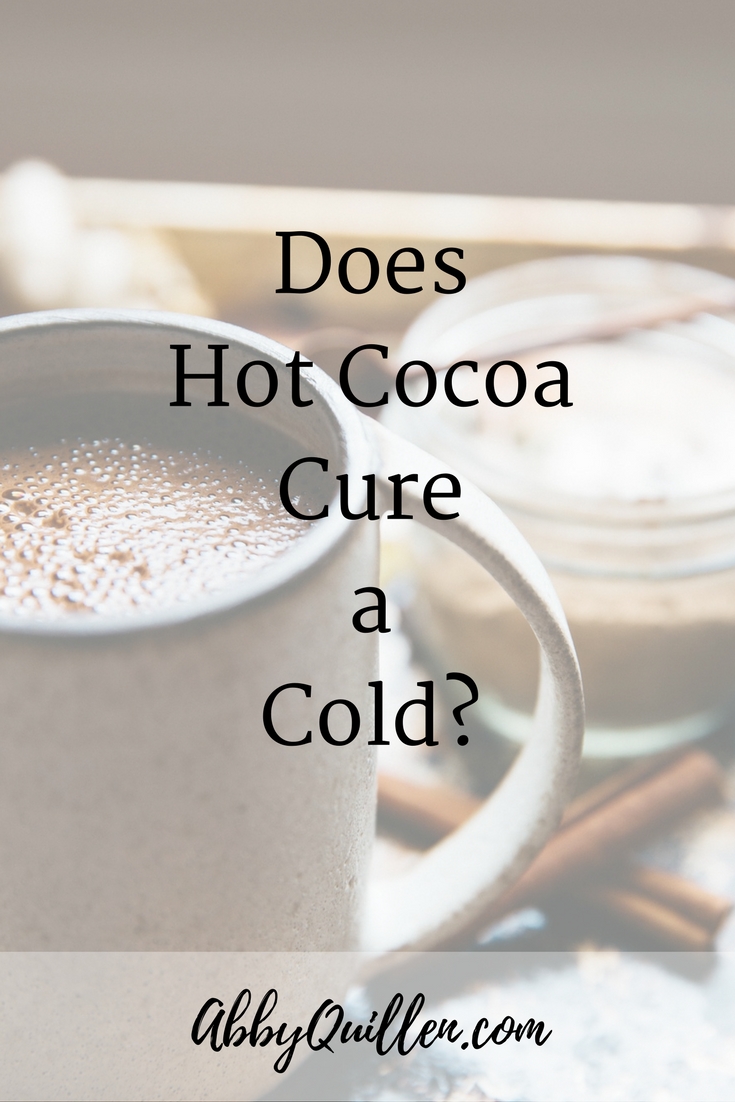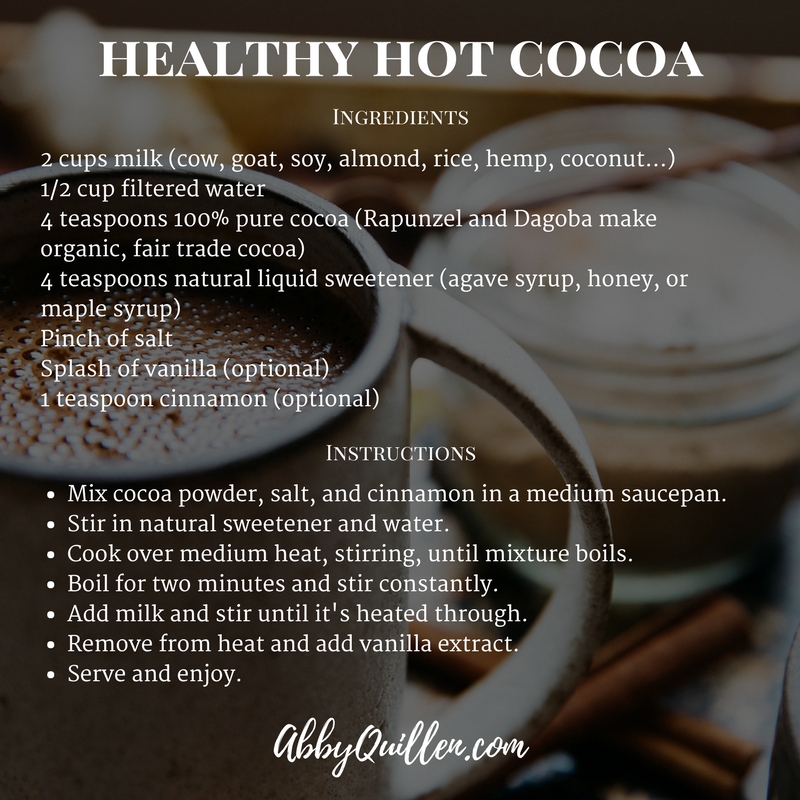Are you sniffling and sneezing? If so, you’re not alone. It seems like our entire city has a cold right now. At our house, we’ve been resting, drinking lots of hot lemon and ginger drinks and broths, getting out in the sunshine, and trying to remember all of those other time-tested cold remedies.
Then, I remembered some research I read awhile ago about a substance that beats codeine when it comes to knocking out a cough – cocoa. That’s right, I recalled a reason to consume chocolate. I felt better just thinking about it.
Then my skepticism kicked in. Didn’t it sound a little too good to be true? Could the confections industry have anything to do with this research into these miraculous health benefits of cocoa?
So I decided to dig up the research again. It’s the theobromine in cocoa that researchers pegged as more effective at keeping hacking at bay than codeine. “Theobromine works by suppressing vagus nerve activity, which is responsible for causing coughing,” a “Science Daily” article about the 2004 study explained. The researchers isolated the theobromine from cacao beans for the study and used it in doses much higher than I would get in, say, a velvety cup of hot cocoa. But still, a large mug could only help.
I was on my way to prepare one, when I glimpsed another “Science Daily” article, this one from 2006. “Scientists at the University of Manchester’s North West Lung Centre have found that codeine – a standard ingredient in cough remedies — could be no more effective than an inactive placebo compound at treating cough,” it read.
Wait a minute, so codeine – the gold standard of cough suppressants that all other cough suppressants are judged against – may not actually, um, suppress coughs? Where does that leave my beloved theobromine?
In general, I’ve been feeling discouraged about medical studies these days. I love to read them, especially when they reveal reasons I should eat chocolate, go for walks, garden, or do any of the other things I enjoy doing. But I’ve started wondering if reading nutrition and medical research might actually be harmful to our health.
Remember when we were supposed to be loading up on antioxidants? Well, according to new research, those oxidants we were fending off with high doses of beta carotene and vitamins C and E actually serve necessary functions in our bodies like fighting toxins and battling cancer.
Remember how we were supposed to be loading up on Vitamin D, because all of us were hopelessly deficient? Well, according to a study commissioned by the U.S. and Canadian governments, “Vitamin D and calcium supplements are unnecessary for most people and may be harmful to some.”

If these findings are troublesome, Sharon Begley’s January 24 piece in Newsweek “Why Almost Everything You Know About Medicine is Wrong” is downright disturbing. She writes:
If you follow the news about health research, you risk whiplash. First garlic lowers bad cholesterol, then—after more study—it doesn’t. Hormone replacement reduces the risk of heart disease in postmenopausal women, until a huge study finds that it doesn’t (and that it raises the risk of breast cancer to boot). Eating a big breakfast cuts your total daily calories, or not—as a study released last week finds. Yet even if biomedical research can be a fickle guide, we rely on it.
But what if wrong answers aren’t the exception but the rule? More and more scholars who scrutinize health research are now making that claim. It isn’t just an individual study here and there that’s flawed, they charge. Instead, the very framework of medical investigation may be off-kilter, leading time and again to findings that are at best unproved and at worst dangerously wrong. The result is a system that leads patients and physicians astray—spurring often costly regimens that won’t help and may even harm you.
Of course, I couldn’t help but read the rest of the research on cocoa. It turns out “the health benefits of epicatechin, a compound found in cocoa, are so striking that it may rival penicillin and anaesthesia in terms of importance to public health … ” Chocolate consumption may also lower blood pressure, prevent heart failure, lower stroke risk, and boost brain power.
Or, hey, maybe not. But I decided to stew over it while making some hot cocoa, not as much because of its purported health benefits, as because I remembered something from my childhood. When my sister or I got a sore throat, sometimes my parents would get us a little ice cream to soothe it. I’m fairly certain ice cream does not cure a sore throat. I’ d guess that quite a few health gurus would argue sugar and dairy worsen a cold. But those ice cream treats made being sick feel not quite as bad.
I whipped up the healthiest hot cocoa I could manage, and it was a huge hit with my son. I think there’s something to the cocoa cure.
[clickToTweet tweet=”Does hot cocoa cure a cold? It couldn’t hurt to experiment. #health #remedies #chocolate” quote=”Does hot cocoa cure a cold? It couldn’t hurt to experiment.” theme=”style1″]
Here’s the recipe, in case you’re feeling a cough coming on.

If you liked this post, check out more of my popular posts about health:
- Why Real Food Beats Nutrition Science
- Simplify Your Medicine Cabinet
- The Healing Power of Trees
- Simple Herbal Tonics: Brews for Beginners
What’s your favorite cold remedy? Are you a believer in the cocoa cure? I’d love to hear from you.
I’m all for a cocoa cure but I find milk makes me mucus-y and makes me cough more.
I hear you on science and diet and health. It’s so hard to follow, so I don’t. I let Damien do the research for our family, he’s so good at that anyway, and then just follow his lead.
I think that’s a pretty common complaint. I just saw this study refuting the milk-mucus connection, but it might have been funded by the dairy industry? Ha ha.
http://www.ncbi.nlm.nih.gov/pubmed/2154152
Ahh, a wonderful reason to indulge in a steaming cup of hot chocolate. Just mentioning steaming hot chocolate brings to mind a story I wrote about being stranded in a snow storm when I was 6 years old. Good old memories.
Hi Joan! I have a great hot chocolate memory from about that age too. Maybe chocolate really is the Food of the Gods, as the Aztecs supposedly called it.
One big key to examining medical studies is looking at who is doing the funding. For instance, it wasn’t surprising when researchers funded by the Campbell Soup company found that lots of salt wasn’t really all that bad for you. Or that after getting negative results about dairy’s impact on the bones of post-menopausal women that the dairy industry never funded a study on that again.
Sadly, I do have a cold now, courtesy of my sweetie who apparently brought it home from him at work. I resisted for days but finally succumbed. I guess I did not drink enough hot cocoa. I’m off now to remedy that with a nice big mug of it. I’m not sure where caffeine weighs in on the cold cures, but the cocoa I’m using is actually decaffeinated so that means I may be getting more of the other “nutrients” it offers. Maybe I oughtta have two cups! 😉
So true. That’s so funny about the Campbell Soup study. I hadn’t heard about that one. I hope you feel better soon!
This is not really a cold remedy, and since I’ve matured into an adult cynic, it no longer works for me. When I was quite young I used to get an occasional sore throat. One of my Aunts would soak a length of white, fluffy yarn in brine and loosely tie it around my neck at bedtime. Invariably, I awoke to a pain-free throat !
Wow, I’ve never heard of that one. That’s amazing that it worked!
I am slowly believing that an awful lot of medicine is psychosomatic and not necessarily chemical. When I see things about X vs Placebo and Dick’s remedy with the string, it occurs to me that by telling someone that something will help if they believe it it does. Whether this extends to more major things, I don’t know.
But a nice warm cup of cocoa that makes you feel better can’t be all bad.
Great blog!
I am so grateful, thank you!
I wanted to comment on the mucous/ dairy thing.
I personally don’t need a study for that one because my body shouts it to me every time. Ice cream, yogurt, (I also eat butter sometimes too) makes me produce mucous period, every time no exception.
Wether I have a cold or not, it doesn’t matter,
I will cough up phlemgh or mucous from it every time.
I know that everybody’s body is different and responds to things differently, but maybe someone else can relate.